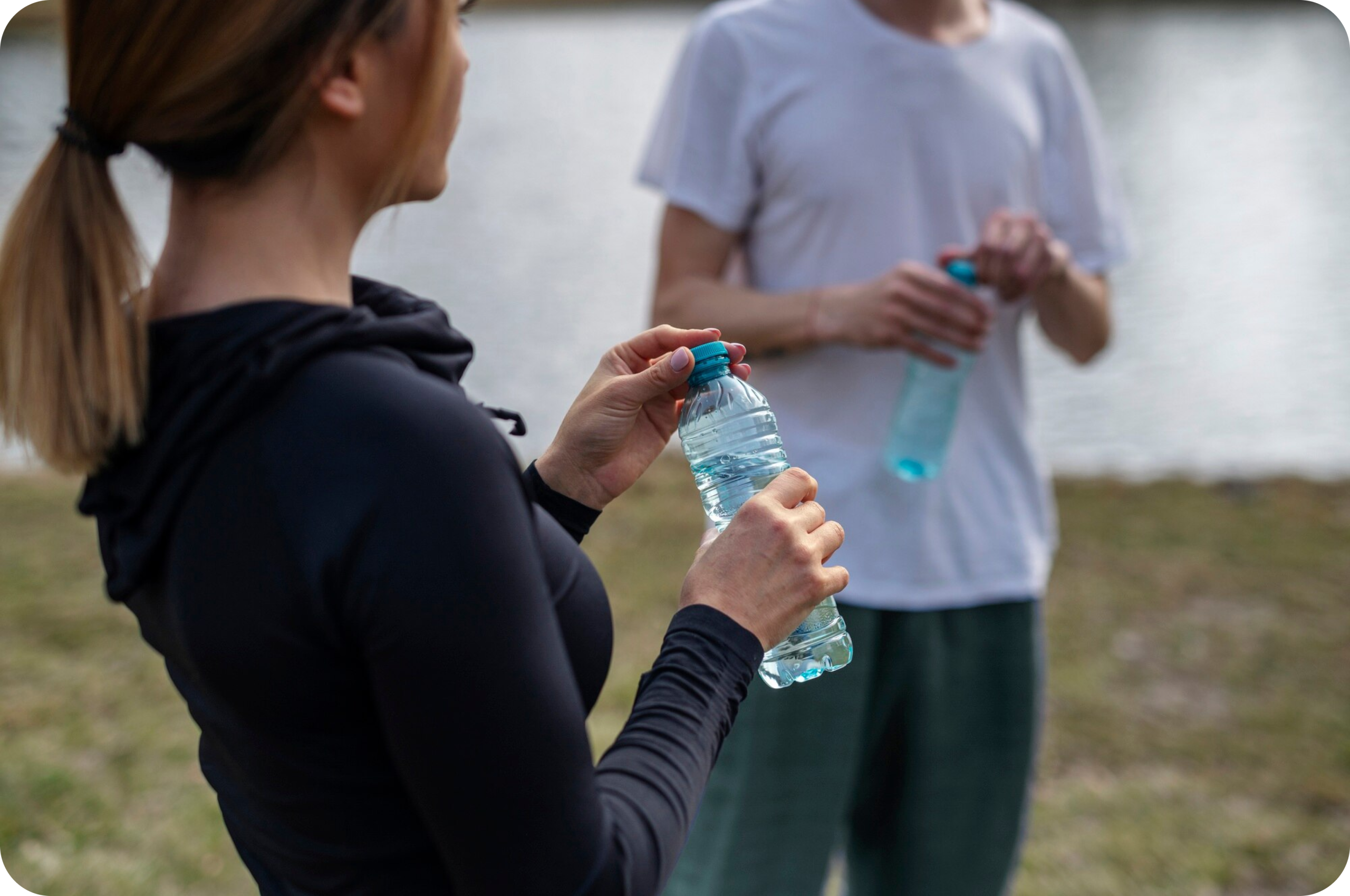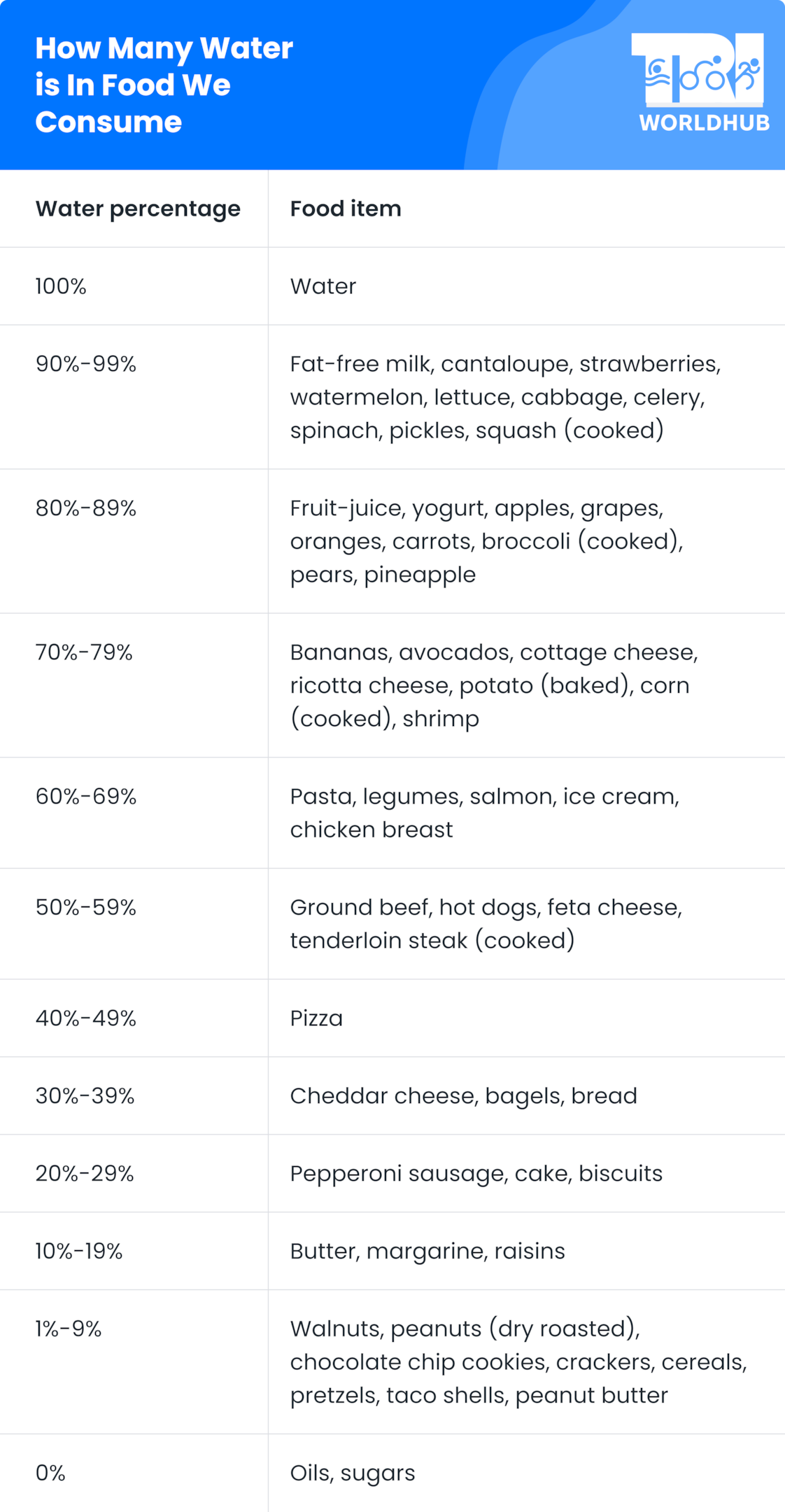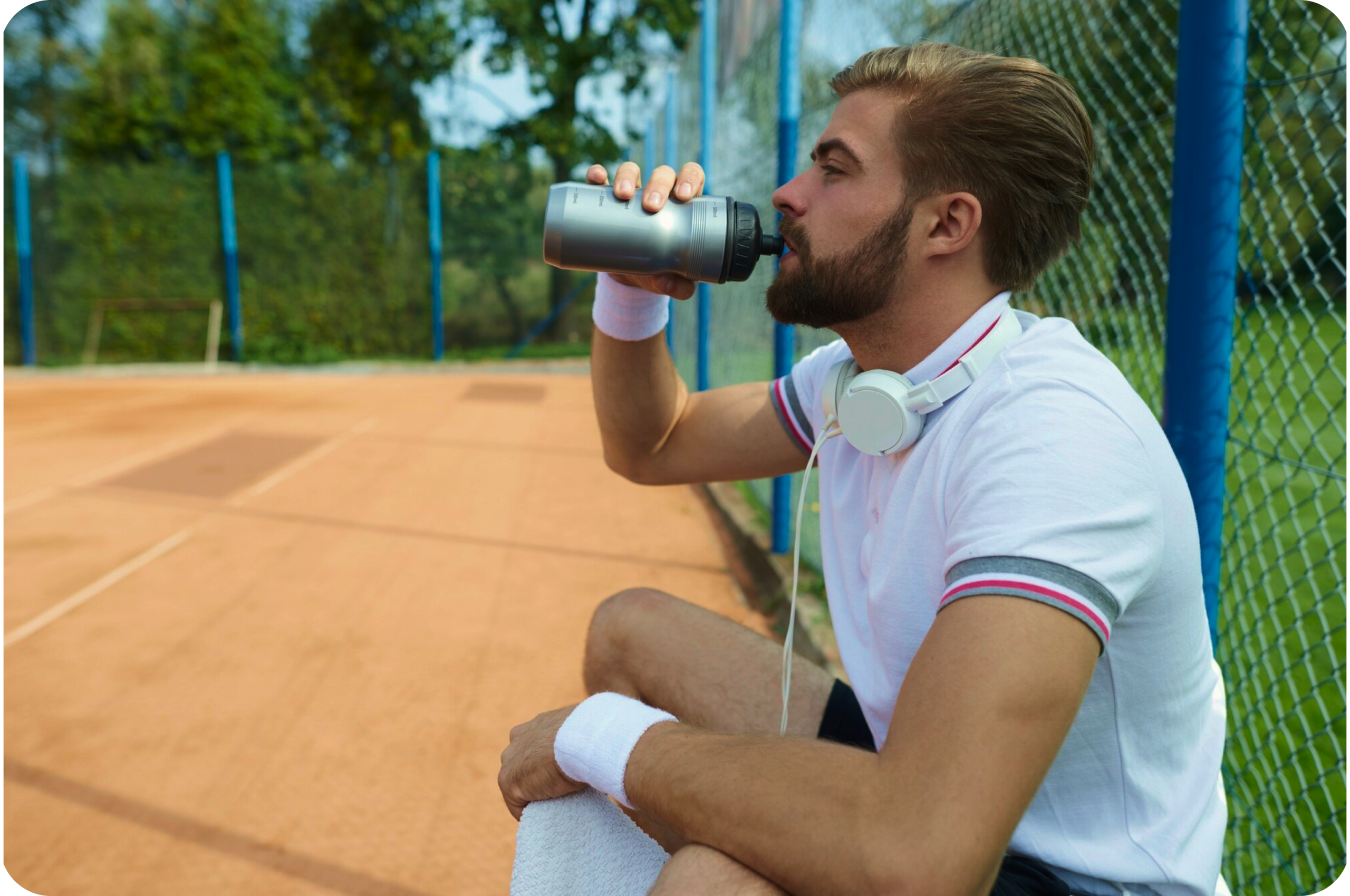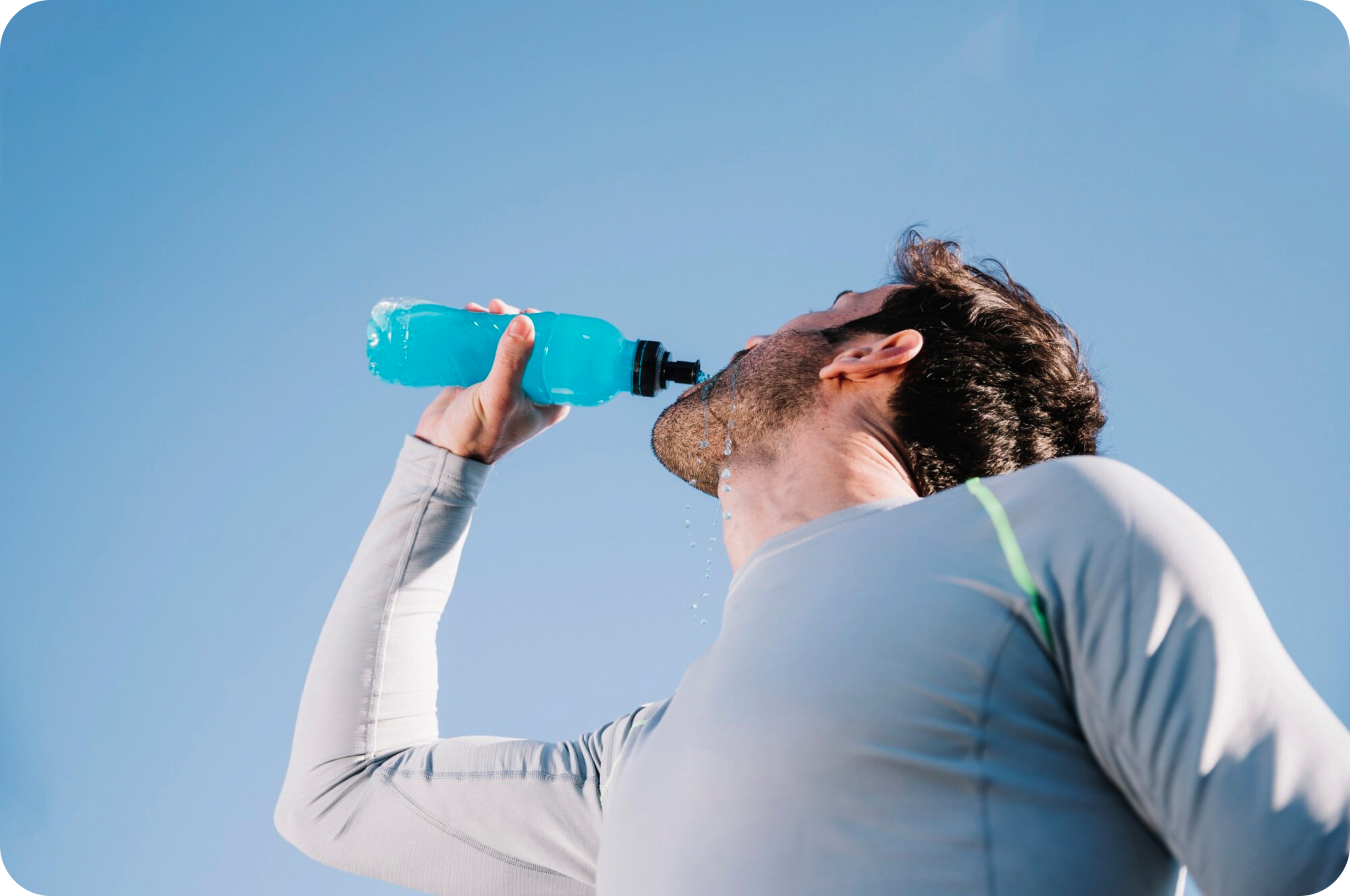Wondering how much water you should drink daily? Our hydration calculator can help you find the answer based on various factors, such as your weight and activity level, among others.
Here, we explore all the factors that affect your drinking water routine.
Let’s dive in!
Our hydration calculator is designed to provide personalized recommendations for your daily water intake.
It considers various factors that influence your hydration needs to ensure you get an accurate and individualized suggestion.
Here’s how our daily water intake calculator works and what factors it considers.
Our hydration equation adjusts for different types and durations of physical activity, accounting for the increased water loss through sweat.
Using our hydration calculator, you can ensure you’re meeting your specific hydration needs.
This will help you support your health, performance, and well-being every day.

When it comes to figuring out how much water you should drink each day, it’s not a one-size-fits-all situation.
There are a few factors that influence how much water you need to drink daily.
Let’s dive into the most important ones to help you understand how much water your body might require.
As we have already mentioned, our body size and muscle mass significantly influence our fluid needs.
Generally, larger individuals or those with more muscle mass require more water.
This is because muscle tissue holds more water than fat tissue, making hydration crucial for muscle function and overall well-being.
If you’re active, especially if you exercise regularly, your water needs increase.
When you sweat, you lose fluids that need to be replenished to maintain hydration.
Your environment plays a significant role in how much water you need.
Hot, humid weather can increase your body’s water needs as you lose more fluids through sweat.
Similarly, high-altitude environments can lead to quicker dehydration.
What you eat also impacts your fluid requirements.
Diets high in sodium or protein can increase your need for water since your body uses more fluids to metabolize and excrete these substances.
Conversely, consuming plenty of fruits and vegetables can boost your hydration due to their high water content.
Certain health conditions can affect your daily intake needs.
For example, illnesses that cause fever, diarrhea, or vomiting increase fluid loss, necessitating higher water intake.
Pregnant or breastfeeding women also require more water to support their baby’s development and milk production.
Age can influence your hydration needs as well.
Many older adults experience decreased thirst, leading to lower water consumption.
On the other hand, children, especially when active, need to stay well-hydrated to support their rapid growth and higher metabolic rates.
Some medications can affect your body’s fluid balance.
Diuretics, for example, increase urine production and can lead to higher water loss. If you’re on medication, it’s important to discuss with your healthcare provider how it might impact your hydration status.
Staying hydrated is crucial for overall health, and understanding where our water comes from helps ensure we meet our daily needs.
The human body gets water from various sources, each contributing to our total fluid intake. Here are the primary sources.
This is the most obvious source of water.
All types of drinks, including water, tea, coffee, milk, juice, and even soft drinks, contribute to your daily fluid intake.
While plain water is the best option for hydration, other beverages also add to your overall water consumption.
Surprisingly, a significant portion of our daily water intake comes from the foods we eat.
Many fruits and vegetables have high water content. For example:
Here’s a table showcasing the water content in various foods, compiled from the research by Altman P. in “Blood and Other Body Fluids” (1961) and further data from the Federation of American Societies for Experimental Biology.
These sources were cited in the study “Water, Hydration and Health” by Popkin B. M., D’Anci K. E., and Rosenberg I. H. (2010).

Use this table to choose foods that contribute to your overall hydration. This will help you support your health and wellness goals.
This is the water produced internally by the body during metabolic processes.
When your body breaks down carbohydrates, fats, and proteins for energy, water is produced as a byproduct. Although this source of water is relatively small compared to beverages and food, it still contributes to your overall hydration.
According to the National Academies of Sciences, Engineering, and Medicine, a general guideline is about 3.7 liters (125 ounces) of water per day for men and 2.7 liters (91 ounces) for women from all beverages and foods.
However, these recommendations can vary based on the factors mentioned above.
A study published in the Journal of Athletic Training highlights that even mild dehydration, as little as a 2% loss of body weight, can impair physical performance.
Therefore, it’s essential to listen to your body and adjust your water intake based on your specific needs.
According to the Institute of Medicine (IOM), about 80% of our total water intake comes from beverages.
This includes plain drinking water, as well as other drinks like coffee, tea, milk, juice, and soft drinks.
The remaining 20% typically comes from food.
If an individual consumes about 3 liters of fluids per day, the breakdown might look like this:
The exact percentages can vary based on factors such as personal preferences, cultural habits, and dietary choices.
For instance, someone who drinks a lot of coffee or tea might have a higher percentage of their fluid intake from these sources compared to someone who primarily drinks water.
Staying properly hydrated is essential for overall health and well-being.
Here are some key benefits of maintaining optimal hydration:
Hydration is crucial for physical activities.
It is essential for regulating body temperature, lubricating joints, as well as transporting nutrients that give you energy. You can feel tired, cramped, and perform poorly if you are dehydrated.
Athletes, in particular, need to stay hydrated to maintain endurance and strength.
Staying well-hydrated is crucial for optimal cognitive function. Even mild dehydration can negatively impact mood, concentration, and memory. Studies indicate that proper hydration can enhance focus, alertness, and short-term memory, contributing to overall better brain performance.
Water plays a key role in digestion by helping to break down food and absorb nutrients efficiently. It also helps prevent constipation by keeping stools soft and ensuring smooth movement through the digestive tract.
Water intake significantly impacts the health and appearance of your skin. Adequate hydration helps maintain skin moisture, improves elasticity, and reduces wrinkles. It also helps flush out toxins, leading to a clearer complexion.
Water helps regulate body temperature through sweating and respiration. Adequate hydration ensures your body can cool itself effectively, preventing overheating, especially in hot weather or during intense physical activities.
Proper hydration can assist in managing and losing weight. Sometimes, thirst is mistaken for hunger, leading to unnecessary eating. Drinking water before meals can help you feel fuller, reducing calorie intake. Additionally, water boosts metabolism, aiding in weight loss efforts.
Water is essential for flushing out toxins from the body. It supports kidney function by helping filter waste from the blood and excreting it through urine. Staying well-hydrated reduces the risk of kidney stones and urinary tract infections.
Water helps lubricate and cushion joints and muscles, reducing the risk of injuries and joint pain. Proper hydration is vital for maintaining the health of cartilage and other tissues, promoting overall joint and muscle health.
Hydration is important for cardiovascular health as it maintains blood volume and ensures proper circulation.
Dehydration can make the blood thicker, making it harder for the heart to pump and increasing the risk of high blood pressure and cardiovascular issues. Proper hydration supports the heart and blood vessels, contributing to overall cardiovascular health.

Staying properly hydrated is critical for athletes to maintain performance, prevent injuries, and ensure overall health.
Here are some general recommendations for water intake tailored to the needs of athletes:

The amount of water you should drink each day depends on several factors, including your weight, activity level, and environment.
A general guideline is about 3.7 liters (125 ounces) of fluids per day for men and 2.7 liters (91 ounces) for women.
These recommendations cover fluids from all beverages and foods, with about 20% of daily fluid intake typically coming from food.
Individual needs may vary, so you need to listen to your body and drink water based on your specific circumstances.
Water intoxication, or hyponatremia, happens when excessive water intake disrupts the body’s electrolyte balance. This condition can be serious and needs urgent medical attention.
Symptoms include headache, nausea, vomiting, confusion, disorientation, and fatigue. Recognizing and addressing these symptoms promptly is crucial to prevent severe health risks.
Dehydration can also cause muscle weakness, spasms, cramps, seizures, unconsciousness, and coma. It’s essential to balance water intake with electrolyte consumption, especially during prolonged physical activities or in hot climates. If you suspect water intoxication, seek medical help immediately.